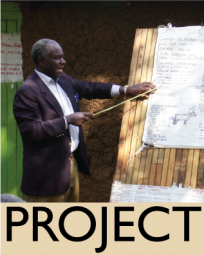Sheikh Technical Veterinary School and Reference Centre

Project Brief/Background
To promote livestock development in Africa, AU-IBAR supports Member States to build human resource capacity at all levels to develop the livestock sector.
Rationale
In Somalia, livestock production, trade and exports represent the most important sources of revenue. However, they have been severely constrained by low human resource capacity comprising of ageing staff who are also isolated from professional development. This notwithstanding, Somalia has to bear with international sanitary constraints (bans) and must face competition within the food sanitary crisis and tougher standards.
It was for this reason that a regional training veterinary school, Sheikh Technical Veterinary School and Reference Centre (STVS), was established. The aim was to train a new generation of veterinary personnel on a curriculum that is well-suited to address the specific livestock production issues of the arid and semi-arid lands of the Horn of Africa and support the sustainable development of the livestock industry in the region.
The school is based on the following concept:
- Training a new generation of cadres for Somalia and for the pastoral zones of the Horn of Africa is a necessity.
- Technically qualified professionals to support the Somali export system is more urgent and more beneficial than "white collars".
- A regional residential training system will allow overcoming of political divisions, provide solutions at regional level and will retain more graduates (hands-on actual issues, less expatriation).
- A specific curriculum was needed to address the specific Somali pastoral production and export-oriented system.
- Until the STVS' establishment, no medical or veterinary training institution was able to provide up to standard services without ambitious technical plateaux (high standard laboratories and personnel, up-to-date information system and innovative training methodology).
The school which was under a project phase (Phase III) was being implemented by AU-IBAR, Terra Nuova and Makerere University, with financial support from European Union (EU), the Danish Embassy and the Italian Cooperation.
STVS Units
The school is currently offering the following courses:
- Diploma in Livestock Health Sciences (DLH)
- Diploma in Livestock Product Safety and Quality Control (DLQ)
- Short term course on recognition of transboundary animal diseases
- Short term course on Basic Laboratory Diagnostic Techniques for Field Veterinarians
- Short term course on Dairy Product Hygiene
- Short term course on ELISA Techniques
- Short term course on Geographic Information System (GIS)
The Reference Centre provides the following services. It:
- acts as an information node (partnership with IGAD/LPI).
- acts as a resource centre (library with repository of documents and e-resources).
- acts as a research centre on pastoral livestock systems.
- provides laboratory and clinical services.
- offers distance education (certificates).
- offers short term training (continuous professional development).
- offers outreach services (vaccination, treatment, disease investigation and control, cross-cutting issues affecting pastoral production systems).
Academic partners
Academic partners of the STVS are the Makerere University, the University of Bologna , the University of Nairobi , the University of Addis Ababa, the University of Hargeisa, the University of Burao, the Ahmoud University and the Kenya Meat Training Institute.
Achievements
- Recruitment and training of tutors; PhD: 3; Master Degree: 8; B Sc: 4; Diploma: 4.
- Development and continuous review of 3-year curriculum in Livestock Health Sciences and Livestock Products Safety and Quality Control using a student-centred methodology.
- Constructed and equipped training facilities including laboratories and student hostels.
- A total of 35 students have graduated with various Diplomas in Livestock Health Sciences and, Livestock Product Safety and Quality Control. There are 68 on-going students (14 being girls).
- Eighty two (82) participants have attended various short-term training courses.
Communication and Visibility
| Attachment | Size |
|---|---|
| doc_20111124_stvs_brochure_en.pdf (921.26 KB) | 921.26 KB |
| doc_20111124_stvs_brochure_fr.pdf (927.52 KB) | 927.52 KB |
